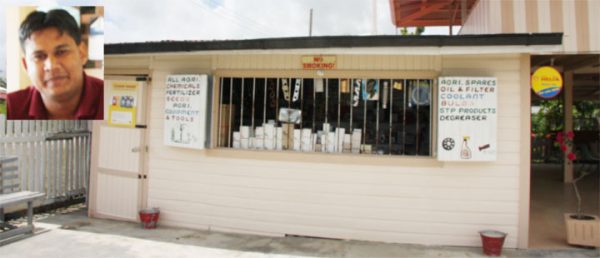It is difficult to turn a blind eye to the edginess among some business houses in the Upper Corentyne. Much of it appears to arise out of the current indifferent performance of the sugar industry. Here, the saying that when GuySuCo sneezes the community catches a cold is much more than an adage, it is a truism.
Bhojnarine Khemraj is not a sugar worker, but he cannot pretend to be indifferent to the events in the sector. Still, he continues to put the circumstances behind him as he persists with his business of marketing auto and agricultural spares. It is, he says, a good living. In not so distant affluent times, the area had witnessed a significant increase in vehicle acquisitions. His Line Path business, B Khemraj Agri & Auto Spares is situated off the main trading route but still does well out of the rise in demand for spares. That was the case since 2009 when he set up his current business.

For all this, it is hard to ignore the evidence that the community could be moving towards an economic slowdown. The farmers from Crabwood Creek still seek him out to secure spares for their agricultural equipment. Before he had ‘set up shop’ they had to resort to an outlet more than 50 miles away. These days, however, there is measure of uncertainty in the business community associated with the circumstances at GuySuCo which extends to his business.
The Upper Corentyne, Khemraj says, revolves around GuySuCo. The decline in sugar production will affect livelihoods across the board. It is as if they’re waiting for this to happen.
It does appear, however, that the services provided by Khemraj are attended by a generous measure of good fortune. He explains that the decline in the sugar industry appears to have coincided with an increase in the ownership of vehicles, bought and utilised as hire cars as people in the community seek other sources of making a living.
Much of his concern is about what could happen “down the road”. For the moment he has little reason to complain. He is, he says, enjoying “reasonable success.” With his business situated on premises gifted to him by his grandfather when he married his wife Bhavan in 2006 his overheads are manageable. Bhavan takes his place in the shop when he is away.
There are, Khemraj says, methods associated with selling spares. “You have to take some risks,” he says. He recalls that his first hurdle was securing finance. Financial institutions often do not warm to first-time small ventures. Eventually, “a friend in the business” facilitated a line of credit.
His advice from that friend was that in a society that thrives on second-hand motor vehicles, maintenance-related stocks like oil, filters and brake pads, are good sellers. That has worked for him though he recalls that the first month “was hell.” He made $14,000 and recollects that he spent days “watching the goods on the shelves”.
Opening hours are set to facilitate patrons. It is a rule of thumb that the service must always be available.
He honours the return of goods policy. Based on certain conditionalities, goods are exchanged or monies refunded. It is Khemraj’s way of keeping faith with his customers.
Khemraj has spent the past four years diligently studying the market for the goods that he sells. These days he has expanded his range of agricultural goods to include seeds, insecticides, safety equipment, headlamps, batteries and spark plugs. He moves his goods from Georgetown by car or minibus.
Among the farmers and motor vehicle owners, good customer service is a lifeline. Good customer service is about going to every extreme to supply requested items. Reliability of a lack thereof can break you, particularly with the farmers.
The out-of-crop period can be a trying time. That is when sales drop and credit requests pour in.
Khemraj says that while the prices of spares have remained relatively steady for the past four years the volume of purchases has increased significantly. He has noted the increase in the number of car dealerships on the Corentyne over the past two years. That, he says, bodes well for his business.
Still, he keeps an eye on the fortunes of GuySuCo. Over time, the industry has become a less than reliable ally and the movement towards reduced reliability on sugar as an employer is clear. The vulnerabilities of the industry never fail to lay bare the nerves of a community that, for one reason or another, is unable to psychologically decouple itself from sugar.




